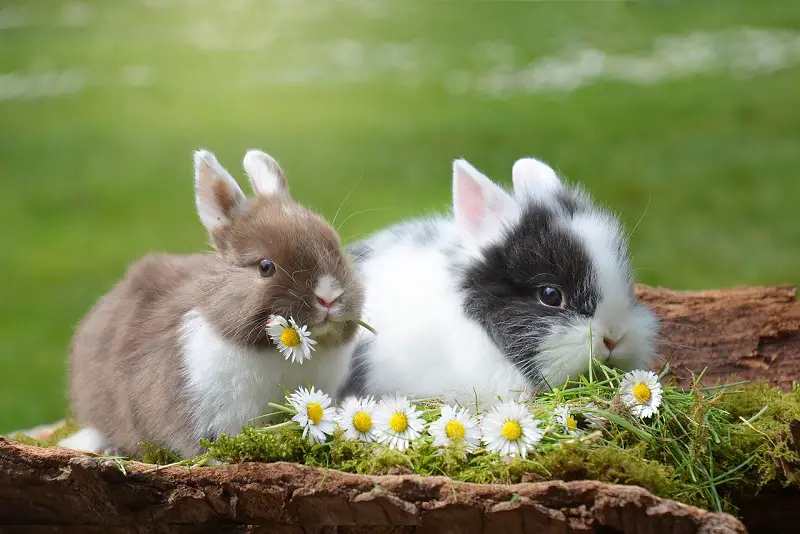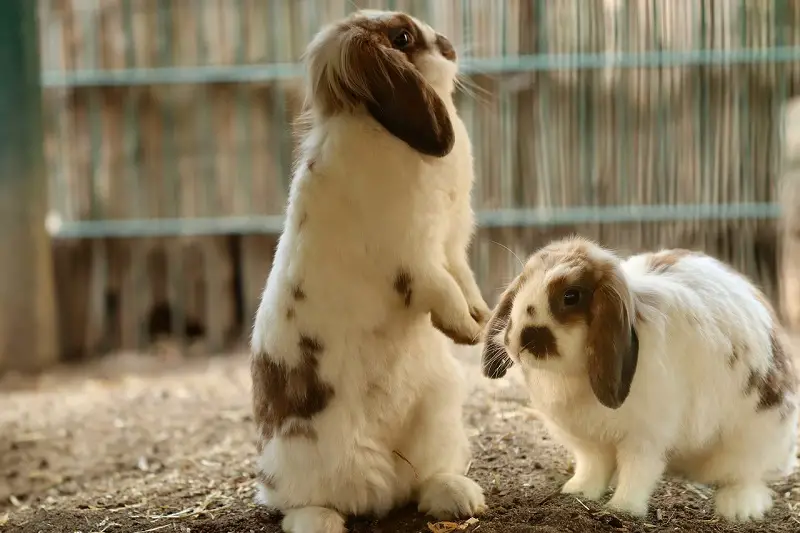Last Updated on June 12, 2023 by Leonard Harper
So, do rabbits mate for life? The short answer is – Rabbits can mate for life if they remain healthy and active. The sperm and egg count in rabbits begin to decrease as they turn 3 years old. Many rabbit breeders will stop breeding their rabbits at the age of 3-4 years because of quality and for the bunny’s health.
Rabbits mature fast and at 6 months of age, they can successfully mate and produce kittens.
If there are many options, they will look for healthy partners to mate with. If not, they will mate with any partners nearby.
Mating in rabbits takes a very short time and can last as little as 20 seconds. Rabbit owners give their pets at least 30 minutes for a successful mating session.
When the doe becomes pregnant, they have a gestation period of 28-32 days before giving birth.

Contents
Why Does a Buck Fall Off After Mating?
When rabbits are about to mate, the female alerts the male that she is ready. The male will attempt some foreplay by circling her while showing her his tail. He may also urinate on her before mounting her.
The actual mating process is short and takes only about 20-40 seconds. The buck then falls off from the doe to one side or backward. This falling action is called a ‘fall off’.
A fall off happens as a result of tensing and relaxing muscles. The buck’s muscles tense gradually while mating, and after mating successfully, they become clenched and then relax suddenly.
This is what causes the buck to fall right off. It is not something serious but a natural occurrence that happens almost all the time.
Are Rabbits Monogamous?
Some wild animals are monogamous like foxes, gibbons, wolves, bald eagles, and swans. They mate with the same partner all through their lives. But what about rabbits?
Rabbits are not monogamous. They mate with different partners throughout their lifetime making them polygamous.
Rabbits do not have family structures like humans do and do not usually form emotional attachments.
Rabbits mate to keep their species alive and to pass on their genes to their offspring. Although pet rabbits can live for 9-12 years, rabbits in the wild do not live long and have a lifespan of 1-2 years.
This is because of harsh living conditions, predators, and illnesses. Rabbits mature fast and begin mating at 4-6 months.
Their gestation period is only 30 days and a litter can have 7-12 kittens. This ensures that their population remains high even if they die young.
Are Some Rabbits Monogamous?

Some rabbits can be monogamous but only circumstances force them to be. Rabbits are naturally promiscuous and do not mate with one specific partner.
In the wild, it’s extremely rare to find monogamous rabbits.
That’s because their populations are high, giving them a huge number of options to mate with.
If something happens to lower their population like starvation, wildfires, diseases, or invasion of their habitats, then they may be forced to become monogamous.
If pet rabbits are paired, they automatically become monogamous. They will only mate with each other for the rest of their lives. However, if you add another rabbit to the cage, they will stop being monogamous.
This happens too if they are living in larger groups. In groups, rabbits have ranks and during mating, males will fight for who will mate the females.
They never have a preference and mate with any female available.
Do Rabbits Grieve Their Mates When They Die?
Rabbits do not usually form emotional attachments, especially in the wild where they are highly populated.
Wild rabbits do not even stay together after mating. When two rabbits mate, the male leaves immediately after the female is bred.
If the male lingers, the female chases them away after a while. The female then goes through the full gestation period, gives birth, and is ready to mate again.
This leaves no room for emotional attachments, and the rabbits will not grieve each other.
However, the case is very different when it comes to domesticated rabbits. Pet rabbits who are paired may develop a bond. Rabbits have a social nature and they interact well with each other.
Spending time in a cage together, eating, playing, and mating with only each other makes pet rabbits form a strong bond.
If one partner dies, the remaining partner will fall into a period of grieving.
They will be saddened by the loss and may grieve for a few weeks. Signs of a grieving pet are:
- Lethargy – They will lack their usual activeness.
- Depression – They may become dull and uninterested in things they normally love.
- Lack of appetite – They will eat little or nothing at all.
- Irritability – They may become aggressive when you go near them.
- Weakness – They will seem weak, mostly due to not eating properly.
If your pet is showing signs of grieving, try to spend time with them as much as possible to keep them occupied.
You can also bring them a new partner. Older rabbits may pass away from stress and grief soon after their partner dies.
Do Male Rabbits Stay with Their Babies?

Male rabbits do not stay with their babies. Kittens are only nurtured by their mothers.
In the wild, male rabbits go away after mating to continue mating with other females leaving the mother to take care of the babies on her own when they are born.
If they both live in a cage, the male rabbit should be taken from the cage to give the mother humble time to take care of her young ones.
A male rabbit will attempt to mate with her again and could trample on the helpless kittens while doing that.
They can also intentionally kill all the kittens. Sometimes they can kill all the males and leave behind only the females. To avoid such a horrific incident, place the male in a separate cage.
Conclusion
Rabbits can mate for their whole life and especially wild rabbits who have very short lifespans. Females can be in heat all year round and they can be bred the day after they give birth.
Most does have strong maternal instincts and will single-handedly take care of their kittens. However, the same cannot be said for the bucks who lack paternal instincts and will even kill the kittens.
Rabbits are what we call prolific breeders. They can produce a huge number of babies in a short period of time. To avoid this, you should neuter and spay your bunnies.
Leo, a novice urban farmer and avid writer hailing from Chicago, Illinois, finds his joy and inspiration in the company of rabbits. His affection for these cuddly creatures started when he was gifted a Mini Rex, named Poe, on his 18th birthday. Poe soon became a source of comfort, companionship, and surprisingly, creative inspiration. He soon expanded his brood to include three more rabbits of different breeds, each with their own engaging tale.
